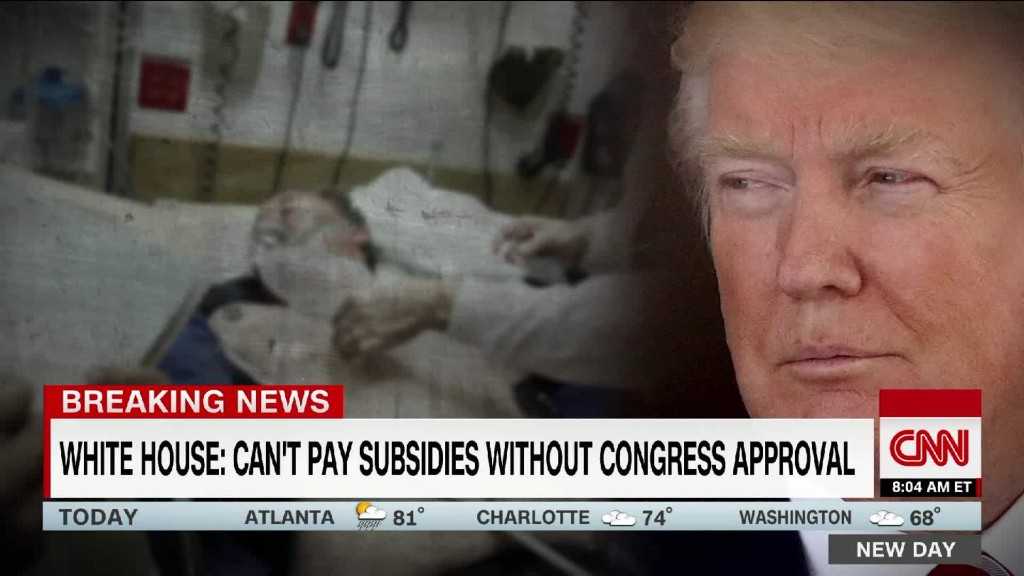
Idaho isn't waiting for Congress to repeal and replace Obamacare.
Only a few weeks after Governor C.L. Butch Otter issued a controversial -- and legally questionable -- executive order allowing insurers to sell plans that do not meet all of Obamacare's mandates, Blue Cross of Idaho unveiled a set of policies that could cost half as much as those sold on the exchanges.
"This is about affordability and choice," Charlene Maher, Blue Cross' CEO, said Wednesday, when announcing the new plans. "The current marketplace is not affordable for middle-class families."
Otter says that he's using the flexibility provided by the Trump administration to bring down costs. Idaho's Department of Insurance is now allowing insurers who offer policies on the Obamacare exchanges to also sell individual plans that base premiums on a consumer's health background, limit coverage to $1 million a year and cover fewer benefits -- all violations of the health reform law.
"We have been waiting patiently while Congress has been unable to find a solution and Idaho families have been forced to buy products that are too expensive and loaded with benefits they don't want or need," Otter said. "Now the door is open for states to pursue our own reasonable solutions. We believe Idaho will lead the way in states taking back control of their insurance markets."
Blue Cross, the largest insurer in the state's individual market, plans to offer five policies under the name Freedom Blue that will differ from its Obamacare offerings. The insurer offered a comparison between one of its new plans and its most popular bronze policy on the exchange. The Freedom Blue plan's medical deductible and co-pays are somewhat lower, but it has a separate deductible for prescription drugs and its out-of-pocket maximum are considerably higher.
Related: Despite Trump's attacks, Obamacare sign-ups dip only slightly
Also, the premiums can vary widely. Consumers will have to fill out a 20-question form about their medical history. The healthiest folks could pay roughly half of what the bronze plan would cost them -- $90 a month versus $238 a month for a 21-year-old. But the maximum rate could cost more -- particularly for older Americans, who tend to have more medical issues. They might have to pay $971 a month if they have pre-existing conditions, compared to $713 a month for the bronze plan. Insurers are not allowed to turn anyone away because of their health backgrounds.
The benefits, however, are roughly the same -- that's because consumers want more comprehensive coverage, said Dave Jeppesen, Blue Cross' executive vice president for consumer health care. The main differences are that the plans don't cover pediatric dental or vision, and one doesn't offer maternity benefits.
The Freedom Blue plans are meant to complement the Obamacare policies, not to undermine them, Jeppesen said. They are designed to provide less expensive options for 110,000 uninsured middle class Idaho residents who don't qualify for federal premium subsidies and can't afford the policies on their own. The plans will also serve to stabilize the exchanges since they are expected to attract younger and healthier consumers, which would lower the rates for everyone.
Blue Cross expects to start selling the Freedom Blue plans next month, with coverage beginning April 1.
Still, the governor's move sent consumer and patient advocates into a panic, with many fearing that other states would follow. They decried it as illegal, or even "crazypants illegal," as Nicholas Bagley, a law professor at the University of Michigan, labeled it.
Meanwhile, 15 patient groups, including the American Heart Association, the March of Dimes and the Leukemia & Lymphoma Society, wrote a letter to Health Secretary Alex Azar this week asking him to declare Idaho's move illegal.
"Idaho's action — if it is permitted to stand — would seriously injure Idaho patients and consumers and significantly destabilize Idaho's entire health insurance market," the coalition wrote.
Related: Trump officials unveil rule that could chip away at Obamacare
Azar, however, does not appear to be in a rush to act on Idaho.
"I'm not aware that our opinions or views have been solicited on that question yet," he told Representative Sandy Levin, a Democrat from Michigan, while testifying before Congress Wednesday on his agency's budget request. "We will look at that whenever it comes to us. Of course, there's a rule of law that we need to enforce."


